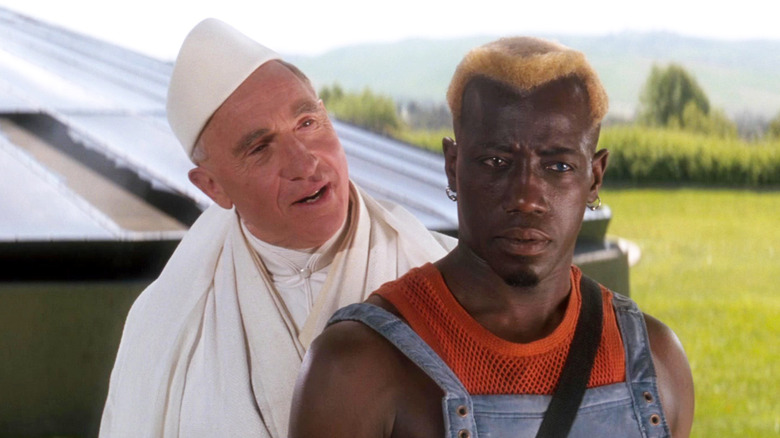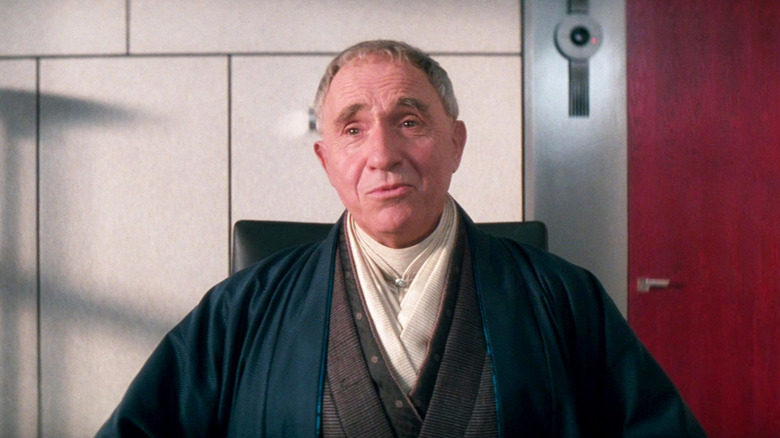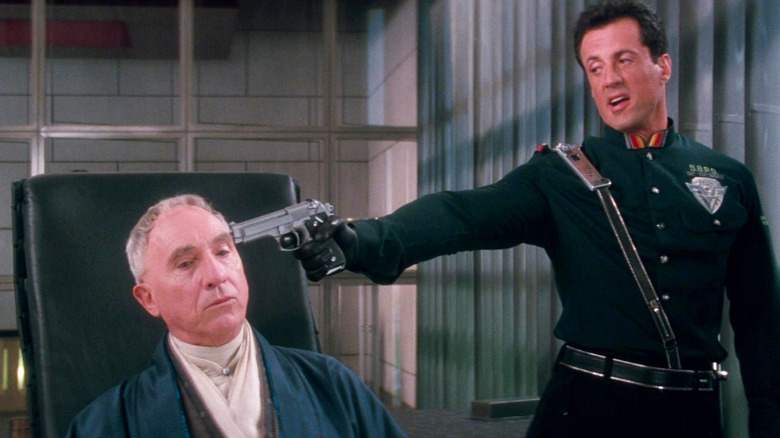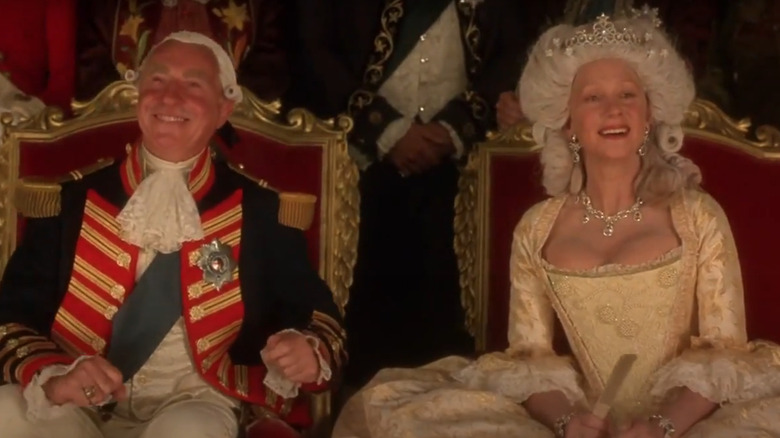Nigel Hawthorne Had A 'Miserable Experience' Shooting Demolition Man
Nigel Hawthorne was a revered actor of stage and screen, whose dignified presence elevated any project. Before his passing in 2001, he appeared in numerous Royal Shakespeare Company productions, and became a household name in the UK for his roles in popular BBC series "Yes, Minister" and "Yes, Prime Minister." The winner of six BAFTA awards, Hawthorne crafted a career as a respected character actor, performing on Broadway and appearing in acclaimed projects from Steven Spielberg's "Amistad" to the Ian McKellan-led "Richard III." He also did "Demolition Man."
A product of Sylvester Stallone's team-up with action producer extraordinaire, Joel Silver, "Demolition Man" is exactly the kind of over-the-top '90s blockbuster you'd expect to come out of that pairing. It's about John Spartan (Stallone), an LAPD cop who gets cryogenically frozen, only to be thawed out in 2032 to help track down his arch nemesis, Simon Phoenix (Wesley Snipes). Phoenix was also frozen but manages to escape after being thawed out for a parole hearing, before running amok in the sexless corporate dystopia of 2032 Los Angeles — or San Angeles, as it's known in the film. Highlights of this all-out action-fest include Stallone bungee jumping from a helicopter, a giant cryo-prison set built on the biggest soundstage at the Warner Bros. lot which gets destroyed by the movie's end, and an opening sequence that contains what might be the finest in Joel Silver's long history of on-screen explosions: the destruction of downtown LA's old Department of Water and Power building. Oh, and Warner Bros. celebrated the film's release by literally blowing up a building.
Now, imagine Nigel Hawthorne, celebrated member of the Royal Shakespeare Company and revered star of stage and screen, slotting into Silver and Stallone's testosterone-fest. As you might expect, it wasn't an easy pairing.
Hawthorne needed Demolition Man
Back in the '80s and '90s, it was almost a right of passage for an English actor to play a Hollywood villain. Alan Rickman was only in LA two days before he was offered the part of terrorist Hans Gruber in 1988's "Die Hard." Although he was tempted to turn down the part in that Joel Silver production, he ultimately gave us one of the best on-screen villains we've yet seen.
And by the early-90s it was Nigel Hawthorne's turn. The British actor was also looking to make his Hollywood debut in order to raise his profile and bring his passion project, "The Madness Of King George III" to fruition. Having starred in the stage play of the same name, Hawthorne was determined to clinch the lead role in the movie version, and needed something to prove he could hold his own on the big screen. Luckily, Joel Silver was casting for "Demolition Man" and felt he'd found his English villain in Hawthorne, offering him the role of Dr. Raymond Cocteau, chief architect and overseer of San Angeles' sanitized utopia.
"Demolition Man" didn't quite fit into the oddly waterlogged action cinema of the '90s, and was a little too off-the-wall to compare to the blockbuster might of "Die Hard." But with Stallone onboard and Silver producing, "Demolition Man" showed promise — even if the script was, according Hawthorne in his memoir (via Filmstories.co.uk), "a load of old hokum but quite promising with some witty lines." Considering Alan Rickman truly elevated "Die Hard" with his turn as Hans Gruber, which also happened to be his Hollywood debut, why shouldn't Sir Nigel take Silver and co. up on their offer? The answer is that he ended up having a terrible time on the film.
'Irrepressible egos'
In "Demolition Man," when Dr. Cocteau meets Wesley Snipes' Simon Phoenix for the first time, he displays his utter contempt for the violent criminal by asking him, "Isn't there a thought repeating in that barbaric brain of yours?" And if you know how Hawthorne felt about Snipes and Stallone, you might sense some real disdain in that line delivery.
In his memoir, "Straight Face," the British actor detailed his experience shooting "Demolition Man," and it wasn't a happy one. Though he dubbed the film's futuristic theme "brilliantly realized," ultimately for him the whole thing was, "a miserable experience." His main gripe was seemingly what he perceived as the "irrepressible" egos of Stallone and Snipes, who according to Hawthorne would, "keep everybody waiting on the set as a matter of course."
Stallone seemed to irk the actor more than anything else. For whatever reason, since the '70s both Sly and Schwarzenegger — who couldn't have had a more intense rivalry back then — had been smoking cigars, and would chomp on a stogie between scenes in whatever project they were working on. Arnie even got his "Predator" co-star Carl Weathers hooked on them during their time filming together. But there was no danger of that with Sly and Hawthorne. Apparently the "Demolition Man" star, "liked to parade around, with a large cigar jammed between his lips, cheerfully wisecracking, until dragged forcibly away by the ever-indulgent Joel Silver, who dressed in what appears to be brown silk pajamas." All of this apparently made scenes with Stallone difficult for Hawthorne, who had to look at Sly's lips to focus: "When they stopped moving, I knew it was my turn to speak."
Hawthorne's Demolition Man role paid off
Hawthorne evidently found Joel Silver to be almost as repellent as Sylvester Stallone. The producer behind the "Lethal Weapon" and "Die Hard" franchises — the latter of which almost featured Wesley Snipes — is legendary in the industry, becoming notorious in the '80s and '90s for his brash demeanor and for basically being a human cartoon character — quick to anger and extremely passionate about pushing the action genre to new, ostentatious heights. On a "Demolition Man" set visit, The LA Times' Patrick Goldstein surmised that, "Sly supplies the brawn, Silver brings the big mouth."
None of which sat well with Nigel Hawthorne, who was personally offended by Silver's love of junk food, and his ability to, "have as many as six arguments running at the same time, mobile phone to his ear, forefinger angrily stabbing the air". Ultimately, Hawthorne summed up his experience on "Demolition Man" by writing, "I'd heard stories of what went on in big studio films, but to see it on a daily basis was something new."
Thankfully, enduring Stallone, Snipes, and Silver paid off for the actor. Hawthorne was cast in the 1994 film version of "The Madness Of King George," earning an Oscar nom for his portrayal of the titular monarch. There were no such accolades for "Demolition Man" but it is fondly recalled by many '90s kids who were captivated by the very over-the-top zaniness that Hawthorne had found so objectionable. And luckily, we never had to endure Joel Silver's "Demolition Man" sequel starring Meryl Streep.



